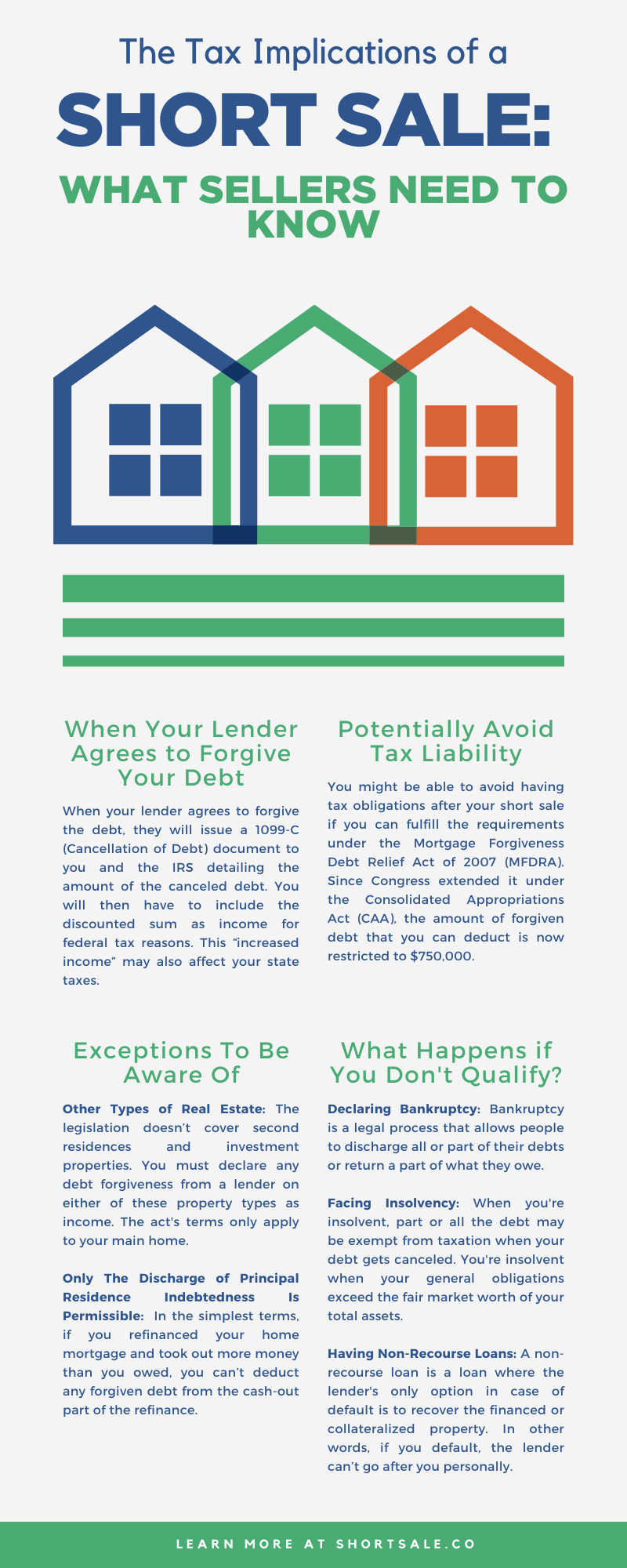Completing the short sale process could have an impact on your taxes in a variety of ways. It's critical to learn about any financial ramifications so you can do everything you can to mitigate them. We've created a short guide on what sellers need to know about the tax implications of a short sale.
Following Your Short Sale
A short sale occurs when a homeowner sells their house for less than the total amount they owe on their loan, and the lender agrees to take the money in return for releasing your property's lien. Essentially, the sale price falls "short" of the amount owed to the mortgage lender. The "deficiency" is the gap between the total debt due and the sale price.
For example, if your lender agrees to let you sell your property for $500,000 but you owe them $575,000, you’ll have a deficiency of $75,000. The lender may be allowed to make a personal judgment against you after the short sale to recover that shortfall amount, depending on your state's laws and the conditions of your short sale agreement. Typically, when a judge grants your lender a deficiency judgment, they can try and collect that amount through standard collection procedures.
However, when entering a short sale agreement, you’ll want to persuade the lender to forgive the shortfall amount. They won't try to collect it after the short sale this way. You would then owe taxes on the deficiency.
When Your Lender Agrees to Forgive Your Debt
When your lender agrees to forgive the debt, they will issue a 1099-C (Cancellation of Debt) document to you and the IRS detailing the amount of the canceled debt. You will then have to include the discounted sum as income for federal tax reasons. This “increased income” may also affect your state taxes.
You need to make sure you're reporting this income, as the IRS will already have this information on file. If you don’t report it, it can lead to significant financial and legal ramifications.
Example
Let's pretend you sold your house for $500,000 but owed $575,000, just like in the last example, giving you a deficiency of $75,000. Your lender has agreed to forgive this deficiency, granting you a cancellation of $75,000 worth of debt. You typically regard that sum as taxable income for yourself.
Potentially Avoid Tax Liability
You might be able to avoid having tax obligations after your short sale if you can fulfill the requirements under the Mortgage Forgiveness Debt Relief Act of 2007 (MFDRA). Initially, the MFDRA allowed taxpayers to deduct up to $2 million in forgiven debt on their primary residence due to mortgage restructuring, foreclosure, or short sale from their taxable income ($1 million when married and filing separately). However, since Congress extended it under the Consolidated Appropriations Act (CAA), the amount of forgiven debt that you can deduct is now restricted to $750,000.
How the MFDRA Works
The act allows taxpayers to deduct certain forms of forgiven debt from their taxable income if they use the forgiven debt for the following:
- Purchasing, constructing, or significantly renovating a primary residence.
- Refinancing debt you've incurred for those same reasons.
This exception applies to debt forgiven between 2007 and 2025. If you signed a formal agreement before January 1, 2026, it also applies to debt forgiven beyond that time limit.
Brief History of the MFRDA
Congress approved the MFDRA in late 2007 to provide tax relief to millions of people who had to settle their mortgage debts for less than what they owed. The legislation was particularly crucial during the housing market crisis, which began in 2007 and dramatically worsened during the following years.
Exceptions to be Aware of
Not all short sales get covered, according to the IRS. The legislation includes two noteworthy exceptions:
Other Types of Real Estate
The legislation doesn’t cover second residences and investment properties. You must declare any debt forgiveness from a lender on either of these property types as income. The act's terms only apply to your main home.
Only the Discharge of Principal Residence Indebtedness is Permissible
You can only forgive debt used to buy, construct, or extensively renovate your primary residence, or to refinance debt obtained for those reasons. In the simplest terms, if you refinanced your home mortgage and took out more money than you owed, you can’t deduct any forgiven debt from the cash-out part of the refinance.
What Happens if You Don't Qualify?
One of those exclusions may apply to your situation. Perhaps the IRS has disqualified you for some other reason. You still have tax relief alternatives.
Declaring Bankruptcy
Bankruptcy is a legal process that allows people to discharge all or part of their debts or return a part of what they owe. The forgiven debt is typically not taxed if you include your house and mortgage that you dismiss in bankruptcy.
Facing Insolvency
When you're insolvent, part or all the debt may be exempt from taxation when your debt gets canceled. You're insolvent when your general obligations exceed the fair market worth of your total assets. Insolvency can be challenging to assess, so if you feel you qualify for this exemption, you should seek the advice of a tax specialist.
Having Non-Recourse Loans
A non-recourse loan is a loan where the lender's only option in case of default is to recover the financed or collateralized property. In other words, if you default, the lender can’t go after you personally. The forgiveness of a non-recourse debt is not taxable income to the borrower; however, there may be other tax consequences.
Some Farm Debts Can Count
Your canceled debt is typically not considered taxable income if:
- You obtained the debt from running a farm.
- More than half of your income from the previous three years came from farming.
- Your loan was owed to a person or organization habitually involved in lending money.
The regulations that apply to farmers are complicated, so if you feel you qualify for this exception, you should seek the advice of a tax specialist.
Understanding the tax implications of a short sale for sellers is critical to prevent any unexpected financial penalties in the future. While professionals at Short Sale Cooperative can help you get the short sale approved, we recommend reaching out to a tax advisor to help you determine how a short sale will affect your taxes.


Recent Comments